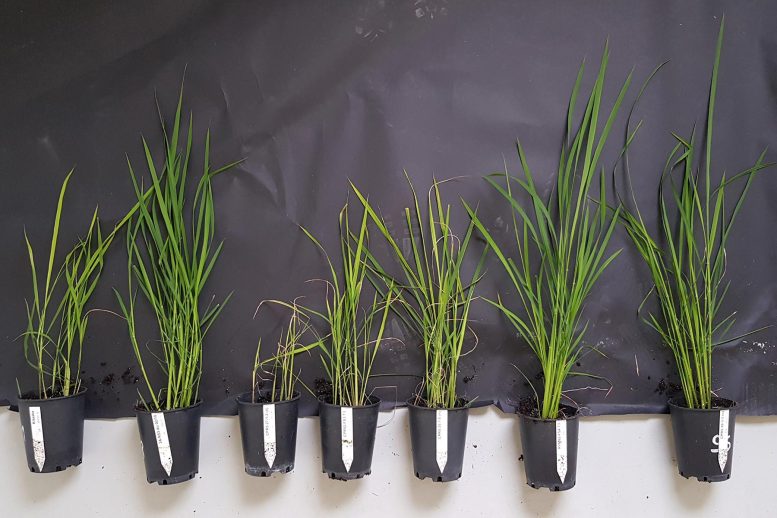Groundbreaking Rice Lines Utilize CRISPR to Combat Deadly African Virus

Different rice plants, such as control plants and mutants, are studied between three and four weeks after inoculation. The photo credits go to IRD / Laurence Albar. The group of researchers from Heinrich Heine University Düsseldorf (HHU) and the French National Research Institute for Sustainable Development (IRD) have propagated rice lines resistant to Rice Yellow Mottle Virus (RYMV) through genome editing. RYMV is a significant agricultural issue in Africa, causing substantial crop losses.
RYMV is an RNA virus transmitted by beetles and direct leaf to leaf interaction. In Africa, this virus often leads to the loss of 10 to 100 percent of rice yields, which can have significant repercussions for subsistence farmers. Currently, no effective protection against the virus exists. Dr. Yugander Arra, the lead author of the study published in Plant Biotechnology Journal, states that creating rice varieties with a RYMV resistance gene is the only true solution.
A team from the Institute for Molecular Physiology at HHU (led by Professor Dr. Wolf B. Frommer) and IRD has invented such resistant rice varieties. The resistant variety is possible due to modifications in the RYMV1, 2, and 3 genes. Rice yield can be significantly affected if the changes lead to adverse side effects, therefore, it is essential to test whether a resistance gene could be transferred to other rice varieties without harmful consequences.
In Africa, high-yield rice varieties based on the Asian species Oryza indica are predominantly used, and these lack the resistance gene. Inserting the resistance gene into these varieties is not a promising solution since such hybrids produce sterile offspring that cannot pass on the resistance
The research group leveraged the CRISPR/Cas genome-editing technique, illustrating that mutations of the RYMV2 gene can create a similar resistance in Asian rice varieties to that observed in the African form. The end goal of the research consortium "Healthy Crops," spearheaded by HHU, is to aid African farmers by modifying African elite rice varieties to be similarly resistant and offering them to these farmers.
The researchers also found that some genetic mechanisms used by plants for survival in early evolution can be detrimental now. For example, a gene that aborts maize kernels during drought could have been beneficial in the wild but is harmful in current agricultural practices. Similarly, rice's resistance trait due to the loss of a non-essential gene function can be switched off without affecting the plant but makes them resistant.
Dr. Eliza Loo of the Healthy Crops Group highlights that this gene, which once aided the plant's ancestors, now leads to severe crop losses during drought and should be turned off since it has no apparent adverse effects. It was discovered that neither switching off the closely related CPR5.2 gene nor the two genes RYMV2 and CPR5.2 leads to impairments under greenhouse conditions. The observations suggest the potential effectiveness of altering RYMV2 for controlling rice disease in Africa.
Reference: “Rice Yellow Mottle Virus resistance by genome editing of the Oryza sativa L. ssp. japonica nucleoporin gene OsCPR5.1 but not OsCPR5.2” by Yugander Arra, Florence Auguy, Melissa Stiebner, Sophie Chéron, Michael M. Wudick, Manuel Miras, Van Schepler-Luu, Steffen Köhler, Sébastien Cunnac, Wolf B. Frommer and Laurence Albar, 20 December 2023, Plant Biotechnology Journal. DOI: 10.1111/pbi.14266
The research took place within the framework of the Cluster of Excellence for Plant Research CEPLAS and was funded as part of Prof Frommer’s Alexander von Humboldt Professorship.




